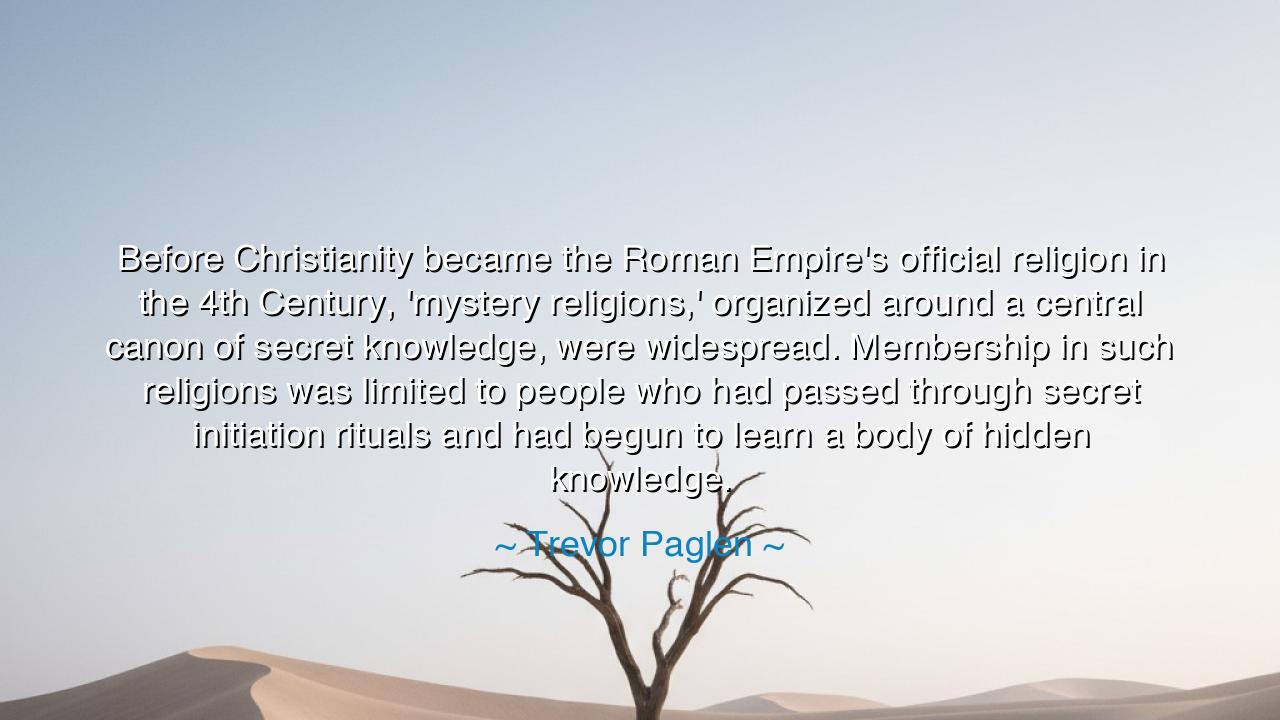
Before Christianity became the Roman Empire's official religion
Before Christianity became the Roman Empire's official religion in the 4th Century, 'mystery religions,' organized around a central canon of secret knowledge, were widespread. Membership in such religions was limited to people who had passed through secret initiation rituals and had begun to learn a body of hidden knowledge.






Hear, O seekers of truth, the words of Trevor Paglen, who declared: “Before Christianity became the Roman Empire's official religion in the 4th Century, 'mystery religions,' organized around a central canon of secret knowledge, were widespread. Membership in such religions was limited to people who had passed through secret initiation rituals and had begun to learn a body of hidden knowledge.” In this saying he lifts the veil of history and shows us how, before the cross was raised upon the empire, countless men and women sought meaning in hidden paths, seeking wisdom not in open squares, but in sanctuaries of secrecy.
The meaning of his words is profound. These mystery religions, whether of Isis, of Mithras, of Eleusis, or of Dionysus, promised not merely ritual, but transformation. They spoke of death and rebirth, of hidden truths, of the soul’s journey beyond this world. To enter them was not to join by birthright, but to prove oneself worthy through initiation, a passage from ignorance into illumination. Paglen reminds us that in these cults, knowledge was not taught to all, but guarded, transmitted only to those willing to pass through trial.
Consider the story of the Eleusinian Mysteries, the most sacred rites of ancient Greece. Year after year, men and women, slaves and kings alike, traveled to Eleusis to undergo initiation. There they reenacted the myth of Demeter and Persephone, descending into darkness and emerging again into light. The initiate was told that they would no longer fear death, for they had glimpsed a truth greater than mortal life. Yet to this day, no one has revealed the full content of these rites, so deeply were they shrouded in secrecy. Here is the power Paglen evokes: a knowledge both hidden and transformative, given only to the few.
Likewise, the cult of Mithras, beloved by Roman soldiers, bound its members with trials of courage and oaths of loyalty. Beneath the earth, in caverns lit by torchlight, they feasted together and shared in mysteries of sacrifice and renewal. Their initiation rituals divided them into ranks, each with greater knowledge than the last, until at last they were said to become “Fathers” of the faith. In such a world, to be a member was not casual—it was destiny, carved into the soul.
The origin of Paglen’s words is his reflection on how societies transmit knowledge and authority. Before the triumph of Christianity, Rome was a tapestry of cults and mysteries, each offering its own path to transcendence. These religions did not proclaim their truths openly to all but held them close, believing that the sacred could only be grasped by those prepared to undergo transformation. By recalling this history, Paglen teaches us that human beings have always longed for more than mere appearances—they have sought the hidden, the eternal, the mysteries that lie beyond ordinary sight.
The wisdom here is timeless: every age and every people hunger for the unseen. Some find it in mystery religions, others in philosophy, others in the faiths that later came to dominate. But the pattern remains—true transformation demands not passive reception, but active initiation, the willingness to endure trial, to pass from ignorance into understanding. What was once enacted in temples and caves now lives on in our own journeys of growth, for each of us must undergo our own passage from darkness to light.
The lesson, O listener, is clear: do not despise mystery, nor assume that all knowledge should be gained without effort. The deepest truths require preparation, humility, and sacrifice. If you seek wisdom, be willing to pass through trial, to abandon ease, to enter the darkness of unknowing before you can emerge into the dawn of understanding. What the ancients called initiation, we may call transformation: a passage that begins in struggle and ends in awakening.
Thus remember Paglen’s words: before the empire bowed to the cross, mystery religions taught seekers through hidden paths, initiation rituals, and sacred knowledge. Let their example remind you that life itself is a mystery school, where each hardship is a rite of passage, and each discovery a step toward illumination. Embrace the trials of your own journey, for they may yet prove to be your initiation into the greater mysteries of existence.






AAdministratorAdministrator
Welcome, honored guests. Please leave a comment, we will respond soon